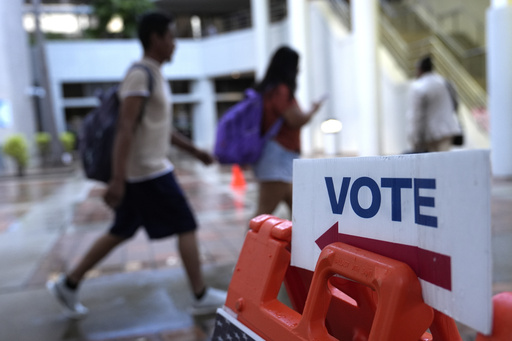
With the support of former President Donald Trump, Republicans are once again embracing early voting. Many party members are heading to the polls in person before Election Day, setting new records for early ballots in significant states such as Georgia and North Carolina.
The Republican Party is optimistic that this strategy will address issues they believe contributed to their losses in the 2020 presidential election and subsequent key races in 2022. Typically, campaigns prefer their supporters to vote early so resources can be allocated toward mobilizing less consistent voters closer to Election Day.
Previously, Republicans had a strong early voting presence, but that changed when Trump began to criticize mail-in voting in 2020, disseminating unfounded theories about the long-standing practice and encouraging his base to wait until Election Day. Now, the GOP is reversing course, advocating for early voting with Trump’s backing, albeit with a hint of conspiracy.
“I need you to vote and I need you to go to the polls before Election Day because they will try on Election Day to keep you home,” Trump urged supporters in North Carolina recently.
The response from Republicans appears to be positive. In North Carolina, for instance, Democrats had a significant lead of over 30 percentage points in the early voting period of 2022, whereas this year, Republicans enjoy a narrow lead of just 1 point. Meanwhile, in Nevada, Republicans have surpassed Democrats in early ballot casting, with around 1,000 more votes logged.
However, interpreting these early voting trends remains complex. The data simply indicates party registration, not how individuals might actually vote. Furthermore, the profile of early voters can fluctuate daily as more ballots are cast. What may seem like a demographic shift in early voting could change dramatically when Election Day results come into play.
It’s worth noting that early voting is still in its early stages; Wisconsin, one of the battleground states, just commenced its early voting on Tuesday. Historical trends indicate that parties can build significant leads from early voting, only to watch them evaporate on Election Day if their voters have already cast their ballots, leaving the opposing side’s supporters to dominate.
“As far as I can tell, the Democrats are still banking more early votes, but Republicans overall are experiencing less of a disadvantage,” stated Michael McDonald, a political scientist from the University of Florida who monitors early voting closely. However, he also warned, “we don’t yet know if this is a simple adjustment or an actual gain for Republicans.”
What is evident is that the revival of nonpartisan early voting has led to record-breaking turnout. Both North Carolina and Georgia reported unprecedented numbers on the first day of early in-person voting. This trend has also influenced states that generally do not compete at the presidential level, such as South Carolina, which recorded its own early voting milestone when it launched on Monday.
Despite this momentum, Republicans still show reluctance towards mail-in voting. Although they have increased their percentage of mail-in ballots in several regions, they remain behind Democrats, particularly in Pennsylvania, where there is no option for early in-person voting, resulting in over 300,000 fewer mail ballots submitted by Republicans compared to their Democratic counterparts. Nevertheless, the GOP is clawing back by enhancing their early in-person voting in contentious states.
The long-standing skepticism surrounding early and mail-in voting, fueled by years of misinformation, seems to have impacted the Republican voter base. At a recent event hosted by Elon Musk, where he voiced support for Trump, some attendees expressed confusion over the push for early voting, with one even questioning, “Why?”
